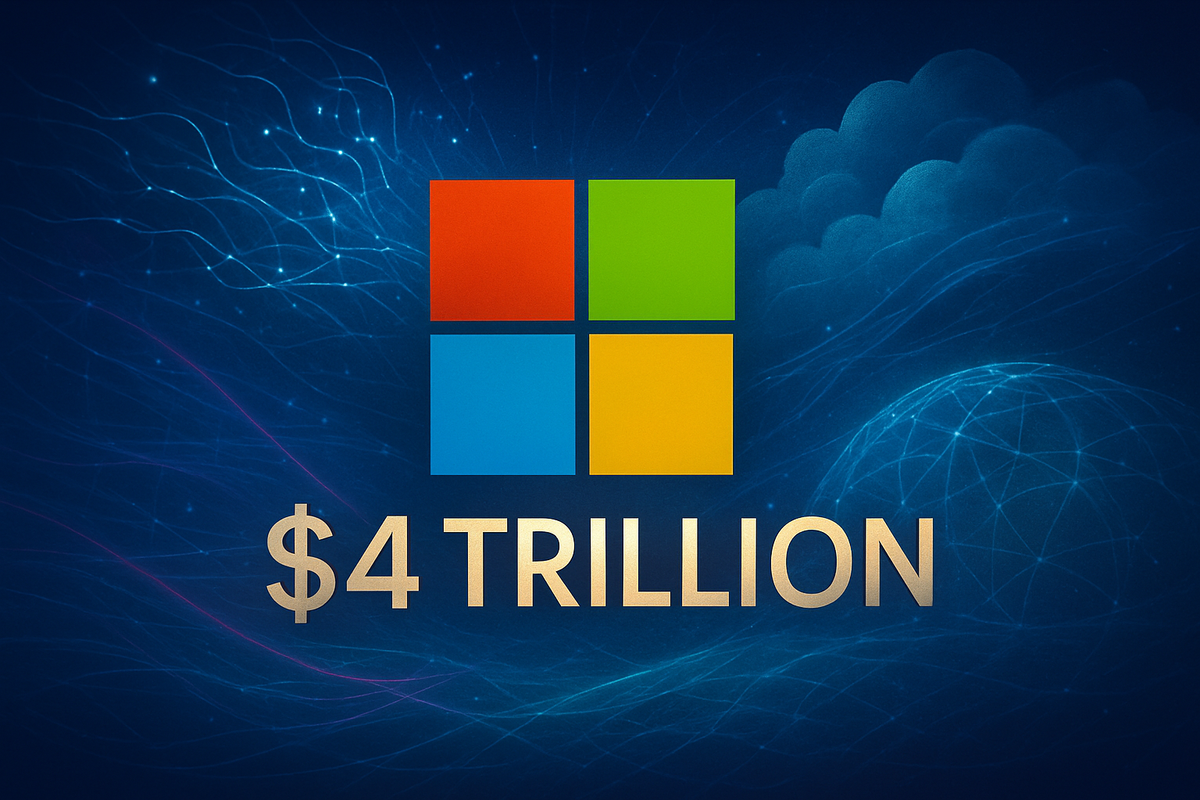Microsoft Soars to $4 Trillion Market Cap, Reshaping the Tech Landscape

Redmond, WA – October 28, 2025 – In a landmark achievement that underscores the relentless ascent of artificial intelligence and cloud computing, Microsoft Corporation (NASDAQ: MSFT) has once again surpassed a staggering $4 trillion market capitalization today, October 28, 2025. This momentous occasion solidifies Microsoft's position as one of an elite trio of companies, alongside Nvidia (NASDAQ: NVDA) and Apple (NASDAQ: AAPL), to reach such an astronomical valuation, sending ripples of optimism and analysis across global financial markets.
The software and cloud giant's shares climbed approximately 3% in early trading as it reclaimed this historic threshold, having first briefly touched the $4 trillion mark in July 2025. This recent surge reflects profound investor confidence in Microsoft's strategic direction, particularly its aggressive integration of AI across its vast product ecosystem and the continued robust growth of its Azure cloud services. The broader market reacted with enthusiasm, with major indices like the Dow Jones Industrial Average, S&P 500, and Nasdaq Composite experiencing surges and reaching new record highs, signaling a largely bullish outlook in the tech-driven economy.
A Deep Dive into Microsoft's Historic Ascent
Microsoft's journey to a $4 trillion valuation is a testament to years of strategic foresight and relentless execution, culminating in its current dominance in key technological arenas. The company's leadership, under CEO Satya Nadella, has successfully pivoted Microsoft from a legacy software provider to a powerhouse in cloud computing and, more recently, a frontrunner in the AI revolution.
The immediate catalyst for today's milestone, and its previous achievement in July, is multifaceted. Central to this success is Microsoft's deep and strategic partnership with OpenAI. This collaboration, which includes a significant stake (reportedly 27%, valued at $135 billion) in OpenAI Group PBC, grants Microsoft extensive access to cutting-edge AI technologies, including advanced models for artificial general intelligence, well into the next decade. This partnership has enabled Microsoft to rapidly integrate AI capabilities, such as its highly anticipated Copilot, across its entire product suite—from Azure cloud services to Microsoft 365, Dynamics, and GitHub—driving enterprise adoption and creating new revenue streams. Complementing its AI endeavors, Microsoft's Azure cloud platform continues to be a powerhouse, demonstrating consistent double-digit growth. Azure revenues have seen significant increases, fueled by the accelerating pace of digital transformation across industries and substantial capital expenditures dedicated to expanding its AI and cloud infrastructure. The company's exceptional earnings performance, reporting an 18% jump in revenues to $76 billion and a more than 23% increase in net income to $34.3 billion, further bolstered investor confidence, proving the tangible financial benefits of its strategic investments.
Winners and Losers in the Wake of Microsoft's Triumph
Microsoft's colossal market capitalization reverberates throughout the technology ecosystem, creating distinct advantages for some and intensified challenges for others. The landscape of winners and losers is shaped by their proximity and strategic alignment with Microsoft's core growth drivers: AI and cloud.
The most apparent beneficiaries include Microsoft (NASDAQ: MSFT) itself, which continues to solidify its market dominance and enjoy substantial revenue growth. Its partner, OpenAI, also wins immensely, benefiting from Microsoft's significant investment and commitments for Azure services that fuel its research and development. Nvidia (NASDAQ: NVDA), as the undisputed leader in AI-capable chips (GPUs), is another major victor, as Microsoft's massive capital expenditures for AI infrastructure directly translate into soaring demand for Nvidia's hardware. Other hyperscale cloud providers like Amazon (NASDAQ: AMZN) through AWS and Alphabet (NASDAQ: GOOGL) through Google Cloud, while competitors, also benefit from the overall surge in demand for cloud and AI infrastructure, as the AI race drives significant investment in computing power across the board. Corporate customers who adopt Microsoft's AI-powered solutions stand to gain from increased productivity and efficiency. Conversely, smaller AI companies and underfunded university labs face significant hurdles in competing for scarce and expensive computing power and top talent against the immense resources of tech giants. Direct competitors in cloud and enterprise software, such as Alphabet (NASDAQ: GOOGL), Amazon (NASDAQ: AMZN), Oracle (NYSE: ORCL), and Salesforce.com (NYSE: CRM), face intensified pressure. While strong in their own right, Microsoft's aggressive AI strategy through Azure demands a robust response. Traditional software companies that are slow to integrate AI or lack a strong cloud presence risk falling behind. Even Apple (NASDAQ: AAPL), despite its own monumental valuation, faces a perception battle in the AI race, with some investors viewing it as lagging in certain AI initiatives compared to Microsoft and Google.
The Wider Significance: A New Era of Tech Dominance
Microsoft's achievement of a $4 trillion market capitalization is more than just a financial milestone; it signifies a profound shift in the global economic landscape, highlighting the escalating dominance of a select group of "Big Tech" firms and the transformative power of AI and cloud computing. This valuation underscores robust investor confidence in Microsoft's strategic direction, particularly its aggressive pursuit of AI integration and its well-established cloud services, demonstrating a willingness to pay a substantial premium for anticipated continued strong earnings.
This milestone fits squarely into broader industry trends where AI and cloud computing are not merely emerging technologies but foundational pillars of the modern economy. Microsoft Azure's consistent growth and the deep integration of AI across the company's offerings, exemplified by Copilot, are driving significant revenue streams and reshaping how businesses operate. However, this immense scale and market power inevitably attract heightened regulatory scrutiny. Governments worldwide are increasingly concerned about antitrust issues, market power, and ensuring fair competition in digital markets. Microsoft's aggressive monetization of AI features, such as Copilot, has already drawn legal challenges, signaling a global trend of regulators scrutinizing AI business practices for transparency and fairness. Historically, periods of transformative technology have led to extreme corporate valuations, often followed by regulatory responses, as seen with the Dutch East India Company or Standard Oil Co. More recently, Nvidia (NASDAQ: NVDA) first crossed the $4 trillion mark, followed by Microsoft and briefly Apple (NASDAQ: AAPL), indicating a new echelon of tech giants dominating the global market.
What Comes Next: Navigating the Future of Tech
Having reached this unprecedented valuation, Microsoft stands at a pivotal juncture, with both immense opportunities and formidable challenges ahead. The company's short-term and long-term trajectory will largely depend on its ability to sustain AI innovation, expand into new high-growth sectors, and adeptly navigate evolving technological and regulatory landscapes.
In the short term (1-3 years), Microsoft is poised for continued robust growth, propelled by its dominant position in cloud computing and strategic leadership in AI. Analysts anticipate sustained double-digit revenue growth for Azure, fueled by increasing global adoption and significant capital expenditures for AI and cloud infrastructure. The monetization of AI through products like Copilot is expected to drive substantial new revenue streams, potentially exceeding $50 billion by fiscal year 2027. Long-term (3-10+ years), AI is expected to remain a cornerstone of Microsoft's strategy, with AI-driven solutions potentially contributing over $100 billion in revenue by 2030, alongside the continued evolution of Azure. However, strategic pivots will be crucial. Microsoft will need to balance aggressive AI investment with a clear path to profitability, proactively address increasing regulatory scrutiny, potentially by fostering open ecosystems, and continue expanding into new geographic and industrial markets. Market opportunities abound in ubiquitous AI integration, hybrid and multi-cloud environments, and escalating cybersecurity demand. Yet, intense competition from rivals like Amazon (NASDAQ: AMZN) and Alphabet (NASDAQ: GOOGL), regulatory headwinds, economic downturns, and geopolitical risks present significant challenges that Microsoft must skillfully navigate to maintain its trajectory.
The Road Ahead: A Market Transformed
Microsoft's achievement of a $4 trillion market capitalization marks a significant chapter in the ongoing narrative of technological advancement and market evolution. It unequivocally highlights the critical importance of AI and cloud computing as the primary engines of economic growth and corporate valuation in the 21st century.
As the market moves forward, investors should watch for several key indicators. Continued robust growth in Azure, successful monetization and widespread adoption of AI-powered features like Copilot, and Microsoft's ability to navigate increasing regulatory scrutiny will be paramount. The company's strategic responses to intensifying competition from other tech giants and its capacity to attract and retain top AI talent will also be crucial determinants of its sustained success. This milestone is not merely a reflection of Microsoft's current strength but a powerful harbinger of a future where technological innovation, particularly in AI, will continue to reshape industries, economies, and societies at an unprecedented pace. The lasting impact of this achievement will be seen not just in Microsoft's balance sheet, but in the broader acceleration of the AI revolution it champions.
This content is intended for informational purposes only and is not financial advice.



